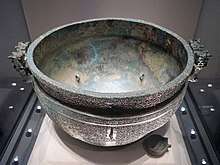Helü
Helü (Chinese: 闔閭; pinyin: Hélǘ) or Helu (Chinese: 闔廬) was from 514 to 496 BC king of the state of Wu[1] toward the end of the Spring and Autumn period of ancient China. His given name was Guang (Chinese: 光); he was initially known as Prince Guang.
Life

Prince Guang was the son of King Yumei, and the nephew of King Liao.[4] He welcomed the Chu exile Wu Zixu into his entourage and, when he sought to usurp the throne of Wu, was introduced by him to Zhuan Zhu. Zhuan assassinated King Liao in 515 BC and the prince became King Helü. The king assigned Wu Zixu to lead the design and building of his "great city," which forms the basis of Suzhou's present old town.[5]
In 506 BC, Helü with the help of Wu Zixu and Sun Tzu, the author of The Art of War, launched major offensives against the state of Chu. They prevailed in five battles, one of which was the Battle of Boju, and conquered the capital Ying. However, Chu managed to ask the state of Qin for help, and after he was defeated by Qin, the vanguard general of Wu troops, Fugai, a younger brother of Helü, led a rebellion. After beating Fugai, Helü was forced to leave Chu. Fugai later retired to Chu and settled there.
In 496 BC, upon hearing that Yunchang of Yue had died, he launched an invasion of Yue, but was injured and subsequently died from his injuries. His son, Fuchai, succeeded him in 495 BC. Helü had two other sons named Bo and Shan. Bo was initially his heir but died before him.
Literary sources
- Records of the Grand Historian
- Gailu text presenting the dialogue between Helü and Wu Zixu, one of the 8 texts from the Tomb 247 (202-186 BCE) excavated at Zhangjiashan, Jingzhou, Hubei, in 1983. The text is paralleled by a Dunhuang manuscript which attributes the conversation to Lord Jing of Qi and Yan Ying.[6]
References
- ↑ 吳王 闔閭 (in Chinese). Retrieved 25 October 2010.
- ↑ Sima Qian, Records of the Grand Historian, volume 66 . (in Chinese)
- ↑ Nienhauser, William H., Junior (2001), "Early Biography", The Columbia History of Chinese Literature, New York: Columbia University Press, p. 514, ISBN 9780231528511 .
- ↑ Records of the Grand Historian,[2] cited in Nienhauser.[3]
- ↑ "Legend for Wu Zixu", eBeijing, Beijing: Beijing Foreign Affairs Information Center, retrieved 15 December 2016
- ↑ Olivia Milburn, The Glory of Yue, 2010:57.
| Regnal titles | ||
|---|---|---|
| Preceded by Liao |
King of Wu 514–496 BC |
Succeeded by Fuchai |